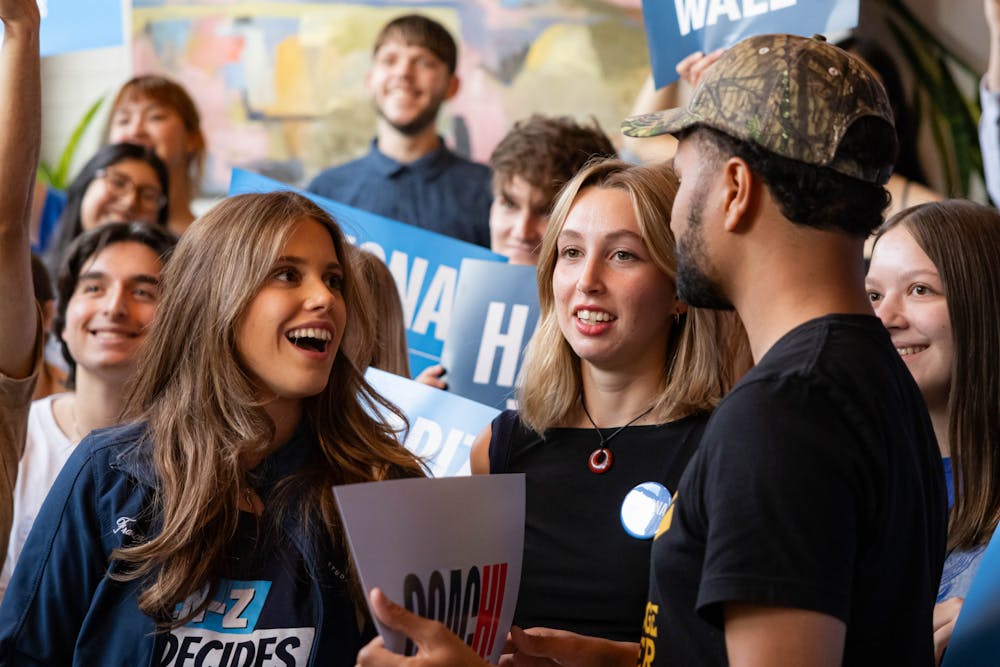With the general election concluded, University students reflect on how campus campaigning efforts from both parties influenced the results of the election. Tempe campus became a hub for many tablings, rallies and events, as the two campaigns fought for the student vote.
Jenny Brian, a teaching professor and the faculty chair at Barrett, The Honors College, highlighted Arizona's political diversity and its growing prominence in national politics as a battleground state as reasons for a high influx of campaigning on campus.
"Arizona State has been the largest public university for many, many years now, so we're just a center of attention, and we have always been very welcoming of all perspectives, so I think it makes sense that candidates would have a lot of high-profile events," Brian said.
Ava Claus, a junior studying sustainability and English literature, said there were differences she noticed between Democratic and Republican events on campus.
"Their (Trump-Vance) events were a lot less focused on information and a lot more focused on building hype and support," Claus said. "It seemed to be a lot of focusing only on one issue as well, whereas all of the Harris events that I saw seemed to have different themes that targeted different issues and different aspects of the Harris platform."
Brian said there was a significance in youth engagement, noting a shift in how campaigns have started to target younger demographics.
"I think that both campaigns on the left and the right spent a lot more time talking to the 18- to 25-year-old demographic," Brian said. "So often, politics can feel very distant. It’s a lot of significantly older people making decisions, and I like when campaigns spend time engaging with and listening to younger people."
While many noted the increased presence of Sun Devils for Harris tabling by the Memorial Union, some felt the Harris campaign could have done more to outreach to college voters.
"I feel like they weren't as prominent as the Republican party with Charlie Kirk and the big rally that happened," said Mirei Shikama, a junior studying global studies and English. "Those two events actually stopped Tempe traffic."
READ MORE: Trump visits ASU Mullett Arena, speaks on border policies and the battleground vote
Katy Ann Dunn, a senior studying political science and chapter president of Turning Point at ASU West Valley, agreed that bringing Charlie Kirk onto campus drew a large crowd of students.
"A lot of people ... either go to debate him or to hate on him, or people go because they love him," Dunn said.
Anusha Rahman, a junior studying political science and economics, attended the event to have open dialogue and felt it could have been a more welcoming environment.
"Me and my friends actually got the chance to speak to a lot of Trump supporters at that rally because we noticed the lack of representation," Rahman said. "We wanted to see how many undecided voters got swung to the Trump side. What we gathered was, it was very hostile … they weren't very open to speaking with us, but they did eventually."
The Charlie Kirk event stood out to students because of his social presence, even though the Harris-Walz campaign really pushed marketing on social media targeting Gen Z voters.
READ MORE: Charlie Kirk's Brainwashed Tour stops at ASU with special guests Bryce Hall and George Janko
"Charlie Kirk is a social figure rather than a political figure," Shikama said. "Since we don't have anyone that's exactly like that, I feel like that was the gap."
Mikah Dyer, a freshman studying secondary education and vice president of Young Democrats of Arizona, said Harris-Walz should have focused more on its working class base, rather than promote its celebrities and elites.
"I definitely get that as people have the perception the Democratic Party is elite," Dyer said. "They think they're highly educated people, which definitely is kind of the base, but we need to be focusing on the everyday working-class person. We should be the party of labor unions again and providing protections for workers, and people should be able to see that."
Despite efforts to engage students, Brian noted that concerns of younger voters often go unaddressed in campaign priorities. In a poll she did with her students, Brian said they showed interest in caring about climate change, finding a job and affording college.
"Those were not the kinds of things you heard about from either campaign," Brian said. "My plea to all political parties is to not treat 18- to 25-year-olds as though they’re token voters or that they are unimportant. The issues that they care about really, really matter."
At the end of the day, Claus said students want to see more informative, engaging events from political parties on campus to feel like their voices matter.
"There are so many students here who maybe aren't engaged in politics or who only just recently registered to vote in Arizona and might not be familiar with Arizona politics," Claus said, "I think there could have been more outreach to those groups of students to make their decisions a little more informed."
Edited by George Headley, Sophia Ramirez and Madeline Schmitke.
Reach the reporter at emuslim@asu.edu and follow @emra_m1 on X.
Like The State Press on Facebook and follow @statepress on X.
Emra is a junior studying political science with a minor in Spanish. This is her first semester with The State Press. She has also worked at the League of Women Voters of Arizona, USG-WV, Honors College Council at Barrett and the Center for the Study of Religion and Conflict.




